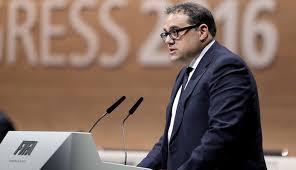By Andrew Warshaw
January 11 – CONCACAF president Victor Montagliani has given another strong hint that the first 48-team World Cup could be jointly staged by the USA, Mexico and his native Canada.
Montagliani said a three-way hosting in 2026 was “a definite possibility” given that few countries can organise an enlarged competition on their own.
“I think there seems to be a prevailing thought that a confederation-type bid with multiple hosts is probably good for football,” Montagliani told reporters following Tuesday’s FIFA Council meeting that approved the first World Cup expansion for 28 years. “Those are discussions that will probably accelerate.”
“In some regions not only does co-hosting make more sense, it’s the only sense. From the organisational standpoint, there will be more games, more training facilities but it increases the opportunity for revenue, for exposure. In the end, I thought the (expansion) decision was made for the right reasons.
“Some countries are maybe spoilt because they go all the time, like Germany, so maybe they take it for granted but, for a lot of countries making it to the World Cup, it’s the biggest thing to happen to that country.”
CONCACAF is a shoo-in for selection for 2026 given that Europe and Asia are excluded following the choice of Russia and Qatar as hosts of the next two World Cups. For the first time under FIFA’s reform process, the 2026 host will be picked by FIFA’s entire 211-nation membership, rather than just an elite few. So far, only Morocco – so often the bridesmaid, never the bride – has expressed any kind of appetite for bidding from outside CONCACAF.
With 80 matches instead of 64, FIFA forecasts $1 billion in extra revenue but Montagliani denied football’s world governing body was putting profit before football and said the FIFA Council decision had been based on thoughful analysis of what was involved rather than “on a nod and wink” – a strategy FIFA was accused of under Sepp Blatter. “Maybe the time has come when we don’t do things on winks and nods any more,” he said.
CONCACAF seems likely to get at least 1.5 extra slots at an expanded tournament, maybe more. Certainly, Mexico and Canada would seek automatic places if they stage the 2026 World Cup jointly with the US. “From a confederation standpoint we are at 3.5. There will obviously have to be more than four in a 48-team World Cup but there is no number we have in our head right now,” said Montagliani.
Asked whether Donald Trump’s presidency would create any friction over a proposed joint bid between the United States and Mexico, he replied: “He’s a big sports fan and you would hope that football can trump politics – no pun intended.”
Montegliano did admit, however, that most confederations would have to tweak their qualification formats after 2022. He didn’t say as much but South America is perhaps a case in point.
With seven of their 10 members likely to be offered places in the finals, CONMEBOL’s two-year qualifying process risks being seriously downgraded. One solution might be to split the format into two qualifying groups of five rather than lump all 10 together. “It’s an issue we will discuss internally if and when the time comes,” CONMEBOL president Alejandro Dominguez of Paraguay told Insideworldfootball.
Contact the writer of this story at moc.l1751413439labto1751413439ofdlr1751413439owedi1751413439sni@w1751413439ahsra1751413439w.wer1751413439dna1751413439

